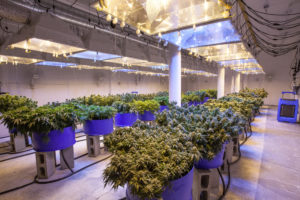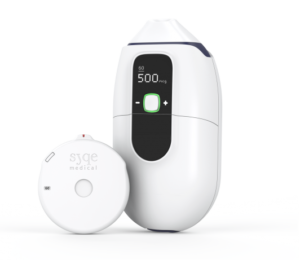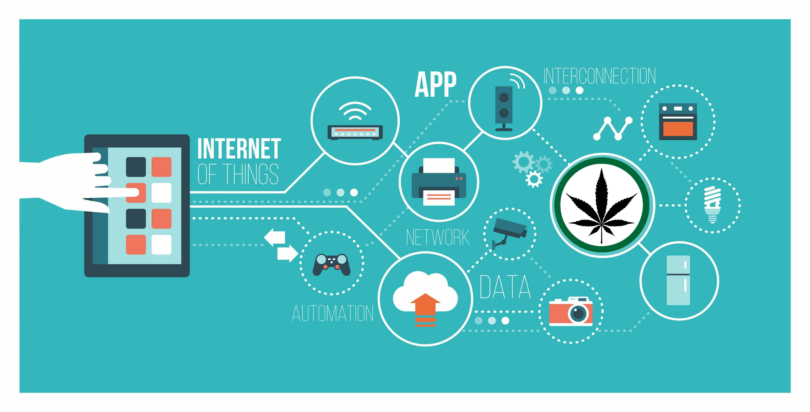Indisputably, the internet has changed the world and the way we do everything – from running our businesses to how we handle day to day tasks.
The possibility of exchanging data on such a large scale has revolutionized countless industries and transformed society into the most fast-paced technological environment that has ever existed. That said, it’s no surprise that the booming cannabis industry has its own version of technology emerging: “cannatech.” This industry is rife with cutting-edge technologies that impact aspects like agriculture, medicine, and retail. Let’s take a look at some of the most interesting applications of IoT in the cannabis industry.
Welcome to the Internet of Things
The Internet of Things (IoT) is the extension of internet connectivity in everyday objects that weren’t typically associated with wifi, such as refrigerators, cars, wristwatches, toothbrushes; and well, you get the point, pretty much everything. These days, there are over 6 billion IoT devices in the world.
These devices can interact with others via the internet and they can be monitored and controlled remotely. Considering it’s one of the fastest growing industries in the world, naturally, many are related to cannabis. Growers, manufacturers, doctors, retailers, and even consumers have benefited tremendously from the use of these products.
Growing – From Home Gardens to Large-Scale Operations

Many indoor grows are operated remotely via IoT technology
Historically, it’s been quite a challenge to set up your own indoor grow room. There are many elements at play that need to be thoroughly considered including space, temperature, lighting, watering, and humidity. Not only that, but indoor grows require daily monitoring to keep track of growth, and that just isn’t feasible for everyone.
Enter IoT with devices such as Seedo, Cloudponics, Leaf, and many others. These companies utilize modern technology to offer consumers fully automated growing stations that can be monitored from anywhere where there is internet connectivity.
“The intersection of cannabis cultivation and IoT will have a great impact on everyday consumers, especially those who consume cannabis medicinally,” explained Nicolas Ruiz, Co-Founder & Chief Product Officer of Cloudponics. “People will have the ability to control the quality and quantity of their cannabis without the fear of pesticides, sales taxes, or reliance on brick and mortar dispensaries.”
But this isn’t just for the modest home grower, large-scale operations are also taking advantage of these new innovations to improve their crop output and meet a continuously increasing demand. For example, many growers are retrofitting their farms with agricultural sensors and connected farming systems that allows them to control their cannabis growing environments from their smartphones, tablets, and computers.
What’s even better is that these systems are storing data, so the longer they run, the more they can use predictive insights increase yields, crop resiliency and energy efficiency. Basically, they learn more about your personal crop needs as time goes on.
Seed-to-Sale Systems
Legal states require what’s known as Seed-to-sale systems, which use tracking devices to identify plants from the moment germination begins, all the way through the growth process, to the point when it’s sold or converted to another product, such as an edible or extract. Typically, all growers and retailers must comply with this system and it gives everyone a way to follow the finished product back to its roots on a software-as-a-service (SaaS) platform.
Because cannabis is still federally illegal, this gives states more oversight into the notoriously secretive industry and makes it possible to trace back any issues such as pesticide use and incorrect labeling. It keeps everyone in the industry compliant and offers transparency into the entire process. A complex system like this would be impossible without IoT.
Remote Monitoring of Medical Cannabis Consumption
In the United States, the use of medical cannabis is more individual since doctors are still not allowed to prescribe it and are often hesitant to even suggest it to their patients. However, it’s a completely different ball game in other countries across the world.

The Syqe Inhaler, which uses IoT to be remotely controlled by doctors
Take Israel for instance, where cannabis has been studied for its medicinal properties since the 1960s and cannabinoid-based medications are much more prevalent. Devices such as the Syqe Inhaler, created by Israeli biotech company Syqe Medical, connects to the internet to allow doctors to remotely monitor their patients’ doses.
Jeff Seigel, co-founder and managing editor of Green Chip Stocks mentioned that “if we want to further legitimize the efficacy of medical cannabis, we must treat it no different than any other form of medicine, which is oftentimes carefully monitored by health care professionals. The data collected from this kind of technology (Syqe) will also help health care professionals treat patients with a new level of precision that we’ve never seen before.”
Consumer Convenience
All these novel technologies are not for only for industry professionals, but for the consumers as well. As cannabis brands continue to try and find their footing when it comes to branding, packaging, and marketing, many consumers may feel hesitant and suspicious about what they’re getting. How accurate is the label on that bag?
Well, by using IoT applications, consumers can take advantage of smart labeling technology such as NFC tag and other “smart tags” that allow them to retrieve information about a product by simply placing their smart phones by them. Think, barcode scanning from your phone at the grocery store.
“Within the medical industry, it’s extremely important that patients get transparency and the ability to trace their products, in order to guarantee reliability and consistent results with their medicine,” noted David Goldstein, CEO of Potbotics. He went on to mention RYAH, the company’s smoking device that allows users to keep track of every session detail including strain, cannabinoid and terpene profiles, dosage inhaled, and even smoking temperature.
This data is then stored in an AI cloud that learns the users’ preferences and provides recommendations to them and possibly their doctors. With RYAH, patients can access lab results and comprehensive product information, and trace their favorite products all the way back to the grower.
Final Thoughts on IoT in Cannabis
This isn’t everything that IoT is used for in the cannabis industry and it barely scratches the surface of the full capabilities of “cannatech.” As the industry grows, so will its high tech vertical and companies who aren’t taking note will be left behind in the dust.









